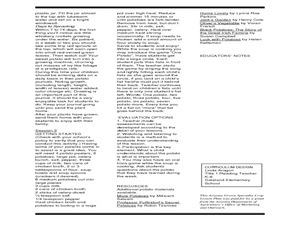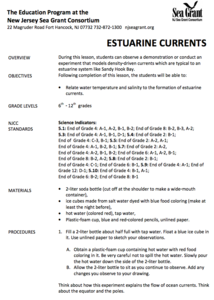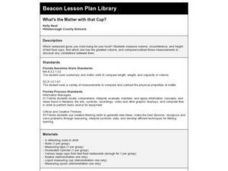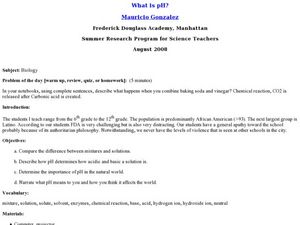Curated OER
I Want It! I Need It!
Students compare the difference between needs and wants. In this needs vs. wants lesson, students play a sorting game with picture cards, depicting illustrations of survival needs and material things. Students sort the picture cards into...
Curated OER
From Mashed to Riches
Students discuss the uses of a potato. For this food group lesson, students identify the five food groups and which one the potato belongs to. They create potato printing, compare different kinds of potatoes, grow a potato plant, and more.
Curated OER
The Colors of Chemistry
Students investigate the acidity and alkalinity of common household products in an experiment. They use red cabbage juice and litmus paper to show the difference between strong acids and bases as they work with vinegar, dish washing...
Curated OER
Estuarine Currents
Students experiment observing a demonstration on models of density-driven currents which are typically found in an estuarine system of water flow. They compare/contrast water temperature and salinity to the formations of estuarine currents.
Curated OER
Terrariums: A Look at the Living and Nonliving World
Third graders examine life in a terrarium and relate it to life in a larger environment. In this terrarium lesson plan, 3rd graders examine how living and non-living things work together by examining the changes in a terrarium. They make...
City University of New York
Electoral College
A presidential election is a lot like the 2004 World Series, and it's also a lot like choosing an orange in a paper bag. Apply the process of the electoral college to these two analogies with a set of lessons about government...
PBS
Heart to Heart
Study heart health and math in one activity. After measuring their resting heart rates by finding the pulse in their wrists, learners build a stethoscope to listen to their heart rate, and note the differences between the two methods.
Institute of Electrical and Electronics Engineers
Water Rocket Launch
How do rockets fly? Teams design, build, and launch a rocket made from a two-liter bottle to explore forces on a rocket such as Newton's Laws of Motion. During the design phase, young engineers draw a diagram of their rocket and...
Statistics Education Web
Consuming Cola
Caffeine affects your heart rate — or does it? Learners study experimental design while conducting their own experiment. They collect heart rate data after drinking a caffeinated beverage, create a box plot, and draw conclusions....
Curated OER
What is a greenhouse?
Students experiment to gain understanding of how a greenhouse retains heat. In this greenhouse lesson, students work with soda bottles and simulate a greenhouse. Students compare data from a vented and intact bottle. Students...
Curated OER
Coca-Cola Ph Lab
Students compare the pH of Coca-Cola from the USA to the pH of Coca-Cola from Mexico. They also test and compare the pH of other liquids.
Curated OER
"Study Finds Soft Drink Consumption Up, Health Down"
Students compare the nutrients in soda with those in milk after reading an online article. They identify micronutrients that are important in the teen years and those that help stave off disease.
Curated OER
Temperature and Pressure
Students conduct an experiment to determine the relationship between pressure and temperature. In this physical science lesson, students collect data and graph them. They compare the results of Celsius and Fahrenheit data sheets.
Curated OER
Keep It Cool
Students complete a science experiment to study insulation, heat transfer, and permafrost. In this permafrost study lesson, students design and test a soda insulator. Students graph their class data and discuss the results. Students...
Curated OER
Properties of Matter: "Sink or Swim"
Third graders recognize that different materials have different properties which can be observed such as texture and bouyancy, and compare and contrast, through observation, ability of some objects to float because of action of...
Curated OER
What's the Matter with that Cup?
Fourth graders measure volume, circumference, and height of fast food cups, find which one has the greatest volume, and compare/contrast those measurements to discover any correlations between them.
Curated OER
Explore: 1st Grade Plant Observation
First graders grow seeds in a mini terrarium. They compare the root systems, stems, leaves, and flowers of the different plants. They categorize the plants and discuss the basic functions of plant parts.
Curated OER
Identifying Acids and Bases
Sixth graders observe the physical and chemical change that can occur in an acid and a base. In this acids and bases lesson plan, 6th graders use cabbage juice to identify, compare, and contrast acids and bases.
Alabama Learning Exchange
Density
High schoolers observe a demonstration of regular soda versus diet soda. In this exploring density instructional activity students complete a lab on density and present a PowerPoint presentations of their results.
Curated OER
Rethink Your Drink
Students examine the sugar content of common beverages. In this adult health lesson plan, students convert grams of sugar to teaspoons. They discuss the benefits of drinking water instead of soda and juices.
Curated OER
As a Matter of Fact
Students rotate through various hands-on experiment stations to explore the concept and properties of different types of matter. They compare some properties of solids, liquids and gases and describe how matter changes from one state to...
Curated OER
Volcano!-Thar She Blows!
Middle schoolers describe how volcanoes are formed. They name the types of boundaries where volcanoes occur. They utilize models to illustrate the occurence of volcanoes and earthquakes along plate boundaries. They compare and constrast...
Curated OER
Foods and Nutrition
Young scholars study nutrition, healthy choices for food, and ways to prepare food. They review the Food Guide Pyramid and play Nutriend Tic Tac Know to select healthy foods. As a group they make pretzels, Mystery Muffins, soda, and...
Curated OER
What is pH?
Pupils describe pH and the importance of it in the natural world. For this Biology lesson students compare the pH of different mixtures.

























